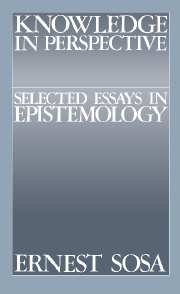Book contents
- Frontmatter
- Contents
- Sources and acknowledgments
- Introduction: back to basics
- PART I WHAT IS KNOWLEDGE, AND HOW IS IT POSSIBLE?
- PART II THEORIES OF JUSTIFICATION
- PART III INTELLECTUAL VIRTUE AND EPISTEMIC PERSPECTIVE: A VIEW PRESENTED
- 9 The foundations of foundationalism
- 10 The raft and the pyramid: coherence versus foundations in the theory of knowledge
- 11 The coherence of virtue and the virtue of coherence
- 12 Testimony and coherence
- PART IV INTELLECTUAL VIRTUE IN PERSPECTIVE: THE VIEW DEVELOPED
- Index
12 - Testimony and coherence
Published online by Cambridge University Press: 08 January 2010
- Frontmatter
- Contents
- Sources and acknowledgments
- Introduction: back to basics
- PART I WHAT IS KNOWLEDGE, AND HOW IS IT POSSIBLE?
- PART II THEORIES OF JUSTIFICATION
- PART III INTELLECTUAL VIRTUE AND EPISTEMIC PERSPECTIVE: A VIEW PRESENTED
- 9 The foundations of foundationalism
- 10 The raft and the pyramid: coherence versus foundations in the theory of knowledge
- 11 The coherence of virtue and the virtue of coherence
- 12 Testimony and coherence
- PART IV INTELLECTUAL VIRTUE IN PERSPECTIVE: THE VIEW DEVELOPED
- Index
Summary
Testimony is important both practically and intellectually. We rely on it for our grasp of history, geography, science, and more. We stake our time and fortune, and even our lives, on our beliefs. Which plane to board, what to eat or drink, what instrument readings to accept — all decided through testimony.
If we are largely justified in accepting testimony, how so? We might appeal to a principle like this:
(T) Testimony is correct more often than not.
But how to justify acceptance of T? There is so much testimony, past, present, and future! There are so many cultures, and cultures so diverse! How can one be sure about anything so strong as T?
Perhaps nothing so strong as T is needed; maybe it's enough to accept this:
(T′) From the sort of people I have dealt with in the sort of circumstances now present, testimony is normally correct.
Some have despaired of justifying any general claim about the correctness of testimony. H. H. Price, for example, prefers to postulate a policy of accepting testimony, in sharp contrast to any substantive belief in the likes of T or T′. Because policies need justification, moreover, for his testimonial policy Price offers the pragmatic justification that if we did not adopt it we would forfeit the rich supply of knowledge brought by testimony.
- Type
- Chapter
- Information
- Knowledge in PerspectiveSelected Essays in Epistemology, pp. 215 - 222Publisher: Cambridge University PressPrint publication year: 1991
- 2
- Cited by



